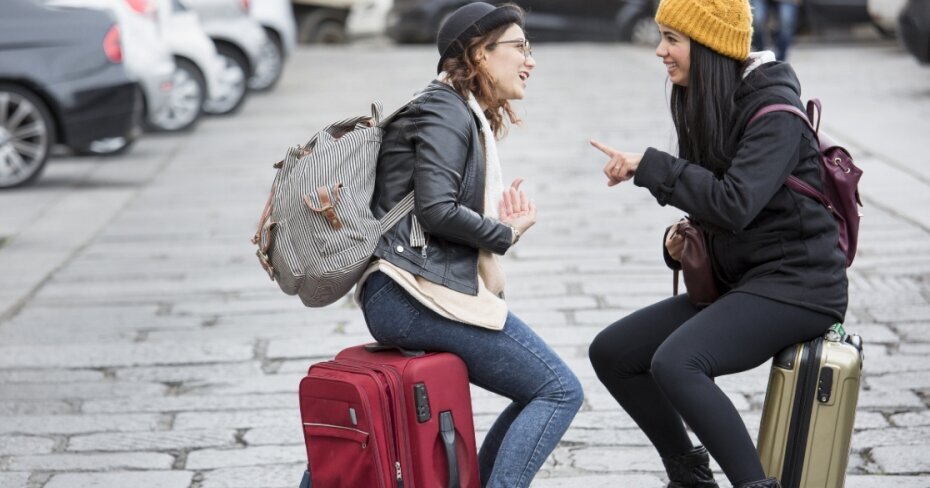Planning to travel again one day? Have the budget talk with your travel partner first
By: Sinead Mulhern on March 31, 2021
By now, the coronavirus pandemic has been going on for a year and counting. Vaccine rollouts have provided a glimmer of hope but for the time being, we continue to abide by COVID restrictions and stay at home as much as we can. If this past year has made you yearn for leisure travel more than ever, you’re not alone.
The day will come when restrictions lift and we’re able to venture farther than our own block. When that happens, you’ll need to be ready to discuss more than just your itinerary with whoever you’re travelling with.
Pre-pandemic, I learned the importance of having the money talk ahead of travel. My brother and I live on different continents so in recent years, we’ve taken to travelling together. In 2018, I took a bus across Ecuador’s countryside to meet him in Quito, where we worked our way east into the Amazon jungle. And by December of 2019, we were busy planning our next trip — this time a Christmas adventure in Peru with his girlfriend, Miranda.
In the weeks leading up to our trip we planned our itinerary, our must-do activities, and what gear we’d need to bring. And then, just after I’d given the trip the green light on my end over a video call, my brother stuck me with the most important question of all: “What’s your budget?”
How much money do you have for this trip? Are you willing to go into debt for some of it? These are the questions to ask one another
At first, I was caught off guard. Then I started to feel worried. Worried that my budget wouldn’t match theirs. Worried that I’d want to spend less money than them and put a damper on their trip. My gut told me to play it straight, though. Given that I live in the region, I wasn’t looking to shell out on a once-in-a-lifetime South American experience. My goals were to see my brother and his girlfriend, have a happy time catching up, and enjoy our main attraction: the Salkantay trek to Machu Picchu. I expected to spend roughly the same amount of money daily as I already do at home in Ecuador, with the exception of accommodations, the odd tour, and a bit more eating out. I travel often and I do so at the mid-range: clean and comfortable yet not needing any bells and whistles.
Luckily, when I told my brother and Miranda this, they had similar expectations. They were excited to spend money on certain Peruvian experiences but were also happy to buy groceries from markets and check out local almuerzo (lunch) deals. We all agreed that highly ranked hostels were the best way to go. While I didn’t necessarily feel uncomfortable laying down my expectations in terms of spending, I could see how one might. For many, personal beliefs around money stand in the way of necessary and honest discussions. But an upfront question like my brother’s might spare everyone a panic attack or two.
Have the travel budget talk — no excuses
As it turns out, that potentially awkward budget talk with your travel partner is pretty important. In fact, Brenda St Louis, a Vancouver-based financial therapist, says it’s the exact conversation you want to have before your trip.
St Louis deals with the tough stuff around money: difficult conversations, financial literacy, our money beliefs and hangups, and so on. Whether you’re looking to reschedule a trip post-lockdown or you’re simply looking to safely plan a weekend getaway as restrictions lift, you must lay the budget out on the table. How much money do you have for this trip? Are you willing to go into debt for some of it? These are the questions to ask one another.
Regardless of which end of the spectrum you fall on, the language you choose when voicing your budgetary needs is essential
“If you have those conversations then you can also say ‘So, if we overspend, how does that feel?’” says St Louis. “It’s like taking each other’s temperature.”
Once you establish how much you want to spend, then you can get into your day-to-day expectations. For instance, do you want to spend money on eating out or will you opt to buy groceries and cook? Are you looking for a fancy hotel, a basic rental, or a hostel? Consider whether or not your expectations are realistic, says St Louis. “Ask what level you want to travel at. Then ask: ‘OK, does that fit into what we have available?’”
In St Louis’ practice, she sees financial shame on two ends of the same spectrum. “You could either lie on the side where you feel shame around how you deal with money or don’t deal with money,” she says. “Or you might feel shame because you don’t understand it. On the other side of it, there are the people who are big budgeters and who track everything but are afraid of people judging them for being cheap.”
Choose the right words when setting financial expectations
Regardless of which end of the spectrum you fall on, the language you choose when voicing your budgetary needs is essential. That’s especially true during the coronavirus era when a shaky economy and job losses have many of us feeling an unexpected financial sting. When talking with your travel buddy, St Louis advises against using statements like “I can’t afford it,” or “You earn more than I do.” These phrases have negative connotations and can cause tension. Instead, use statements like “I’d like to have my money last longer doing this activity,” or “That’s not really where I’d like to spend my money.”
Do yourself a favour and just have the conversation about what you do and don’t want to spend on your trip — even if it’s just a weekend escape from the city
I used similar tactics when travelling with my brother and Miranda in Peru. Because my budget was smaller than my brother’s, and because I already live in the same region of South America, I made it clear that I wasn’t going to spend on costly tours or activities that I could do on any given day in Ecuador. For example, a trip to Rainbow Mountain just didn’t have the same novelty for me. An avid hiker, I regularly climb up similar-looking terrain at a low-to-no cost. I also said no to a boat tour because it just didn’t feel like a priority, and made the effort to go to local vegetable markets and buy beers in corner shops. The good news was that both my brother and his girlfriend were eager to save, too. I even taught Miranda how to ask about prices and negotiate in Spanish.
Salary isn’t everything when it comes to somebody’s travel budget
I’m a freelance writer, my brother is a civil engineer, and Miranda is in medical school. It’s no secret that our incomes differ greatly. But contrary to what many of us believe, salary doesn’t necessarily indicate a person’s travel budget. As St Louis points out, some people earn more but carry more debt, while others earn a modest income but save a lot in order to travel.
That’s something I had been missing. It’s true that I earn a lower salary than many of my Canadian friends and family (and I’m OK with that). It’s also true that my day-to-day life costs much less than theirs and that travel is something I prioritize with that extra income.
So, do yourself a favour and just have the conversation about what you do and don’t want to spend on your trip — even if it’s just a weekend escape from the city. If you skip it, you’re inviting unwanted stress for the whole trip. “You could just be having a silent anxiety attack because you don’t want to go into debt but you’re not willing to speak about it,” says St Louis. “So you don’t get to enjoy your trip because you’re so worried about how much debt you’re incurring.”
During that call in the weeks leading up to our Christmas vacation, my brother, Miranda and I saved each other a lot of stress. Because I knew that they also wanted to save when possible, I didn’t spend our time in Peru secretly wondering if my budget was holding them back. And because I explained where I was and wasn’t willing to spend, I didn’t feel guilty on the days when I opted out of certain activities. Knowing where everybody stood meant we avoided mini panic attacks every time we decided on a restaurant, bar, and accommodations. Most importantly, we enjoyed each other’s company without shame, judgement or money worries.
.jpg?itok=DXZhvbFe)

